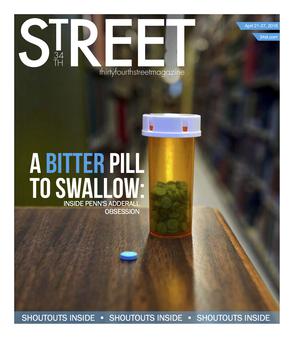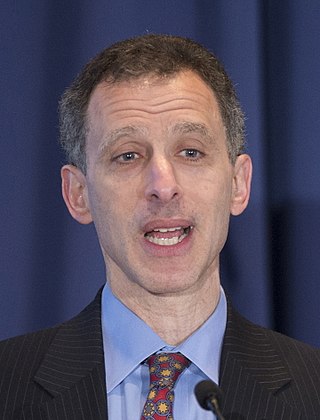
The Atlantic is an American magazine and multi-platform publisher. It features articles in the fields of politics, foreign affairs, business and the economy, culture and the arts, technology, and science.
Bryan Douglas Caplan is an American economist and author. Caplan is a professor of economics at George Mason University, research fellow at the Mercatus Center, adjunct scholar at the Cato Institute, and former contributor to the Freakonomics blog and EconLog. He currently publishes his own blog, Bet on It. Caplan is a self-described "economic libertarian". The bulk of Caplan's academic work is in behavioral economics and public economics, especially public choice theory.

Arthur Betz Laffer is an American economist and author who first gained prominence during the Reagan administration as a member of Reagan's Economic Policy Advisory Board (1981–1989). Laffer is best known for the Laffer curve, an illustration of the theory that there exists some tax rate between 0% and 100% that will result in maximum tax revenue for government. In certain circumstances, this would allow governments to cut taxes, and simultaneously increase revenue and economic growth.

Janet Louise Yellen is an American economist serving as the 78th United States secretary of the treasury since January 26, 2021. She previously served as the 15th chair of the Federal Reserve from 2014 to 2018. She is the first woman to hold either post, and has also led the White House Council of Economic Advisers.

The Daily Pennsylvanian, Inc. is the independent student media organization of the University of Pennsylvania. The DP, Inc. publishes The Daily Pennsylvanian newspaper, 34th Street magazine, and Under the Button, as well as five newsletters: The Daily Pennsylvanian, The Weekly Roundup, The Toast, Quaker Nation, and Penn, Unbuttoned.
Robert Charles Pozen, known as "Bob", is an American financial executive with a strong interest in public policy. He is the former chairman of MFS Investment Management, the oldest mutual fund company in the United States. Previously, Pozen was the President of Fidelity Investments.

Paul Michael Romer is an American economist and policy entrepreneur who is a University Professor in Economics at Boston College. Romer is best known as the former Chief Economist of the World Bank and for co-receiving the 2018 Nobel Memorial Prize in Economic Sciences for his work in endogenous growth theory. He also coined the term "mathiness," which he describes as misuse of mathematics in economic research.

Simeon Dyankov is a Bulgarian economist. From 2009 to 2013, he was the deputy prime minister and minister of finance of Bulgaria in the government of Boyko Borisov. He has been a vocal supporter of Bulgaria's entry into the Eurozone. Before his cabinet appointment, he was the chief economist of the finance and private sector vice-presidency of the World Bank.

Peter Kent Navarro is an American economist who served in the Trump administration, first as Deputy Assistant to the President and director of the short-lived White House National Trade Council, then as Assistant to the President, Director of Trade and Manufacturing Policy in the new Office of Trade and Manufacturing Policy; he was also named the national Defense Production Act policy coordinator. He is a professor emeritus of economics and public policy at the Paul Merage School of Business, University of California, Irvine, and the author of Death by China, among other publications. Navarro ran unsuccessfully for office in San Diego, California, five times. Navarro, who sought to overturn the 2020 presidential election, is the only former White House official ever imprisoned on a contempt-of-Congress conviction.

Mohamed Aly El-Erian is an Egyptian-American economist and businessman. He is President of Queens' College, Cambridge, and chief economic adviser at Allianz, the corporate parent of PIMCO where he was CEO and co-chief investment officer (2007–14). He was chair of President Obama's Global Development Council (2012–17), and is a columnist for Bloomberg View, and a contributing editor to the Financial Times.

Kevin Allen Hassett is an American economist who is a former Senior Advisor and Chairman of the Council of Economic Advisers in the Trump administration from 2017 to 2019. He has written several books and coauthored Dow 36,000, published in 1999, which argued that the stock market was about to have a massive swing upward and would reach 36,000 by 2004. Shortly thereafter, the dot-com bubble burst, causing a massive decline in stock market prices. The Dow finally did reach 36,000 as the Covid pandemic receded in late 2021.
Diana Muir, also known as Diana Muir Appelbaum, is an American historian from Newton, Massachusetts, best known for her 2000 book, Reflections in Bullough's Pond, a history of the impact of human activity on the New England ecosystem.
Binyamin Appelbaum is the lead writer on business and economics for the editorial board of The New York Times. He joined the board in March 2019. He was previously a Washington correspondent for the Times, covering the Federal Reserve and other aspects of economic policy. Appelbaum has previously worked for The Florida Times-Union, The Charlotte Observer, The Boston Globe and The Washington Post. He graduated in 2001 from the University of Pennsylvania with a B.A. in history. He was an executive editor of the student newspaper, The Daily Pennsylvanian.

Dambisa Felicia Moyo, Baroness Moyo is a Zambian-born economist and author, known for her analysis of macroeconomics and global affairs. She has written five books, including four New York Times bestsellers: Dead Aid: Why Aid Is Not Working and How There Is a Better Way for Africa (2009), How the West Was Lost: Fifty Years of Economic Folly – And the Stark Choices that Lie Ahead (2011), Winner Take All: China's Race for Resources and What It Means for the World (2012), Edge of Chaos: Why Democracy Is Failing to Deliver Economic Growth – and How to Fix It (2018), and How Boards Work: And How They Can Work Better in a Chaotic World (2021).

Jeremy Chaim Stein is an American economist and the Moise Y. Safra Professor of Economics at Harvard University; he also chaired Harvard's economics department. He served as a member of the Federal Reserve Board of Governors from 2012 to 2014. Stein served as president of the American Finance Association in 2008.
Dave Donaldson is a Canadian economist and a professor of economics at Massachusetts Institute of Technology. He was awarded the 2017 John Bates Clark Medal and elected fellow of the American Academy of Arts and Sciences in 2020.
Jason Cummins is an American economist. He is the Head of Research and Chief US Economist at Brevan Howard Asset Management, an international hedge fund management group. Cummins is the Chairman of the Treasury Borrowing Advisory Committee (TBAC), a government-appointed panel under The Securities Industry and Financial Markets Association (SIFMA). Cummins also serves as a trustee on the board of The Brookings Institution and director on the board of Peterson Institute for International Economics.

Mary Colleen Daly is an American economist, who became the 13th President and chief executive officer of the Federal Reserve Bank of San Francisco on October 1, 2018. She serves on the Federal Reserve's rate-setting Federal Open Market Committee on a rotating basis. Previously, Daly was the Executive Vice President and Director of Research of the Federal Reserve Bank of San Francisco, which she joined as an economist in 1996.

Transaction Man: The Rise of the Deal and the Decline of the American Dream is a non-fiction book which chronicles the role of corporations in relation to the American economy and shifts in public policy by Nicholas Lemann, who is a veteran journalist and a The New Yorker staff writer.
Anat Ruth Admati is an economist and currently the George G.C. Parker Professor of Finance and Economics at Stanford Graduate School of Business. In 2014, Time listed her as one of the 100 Most Influential People in the World.













